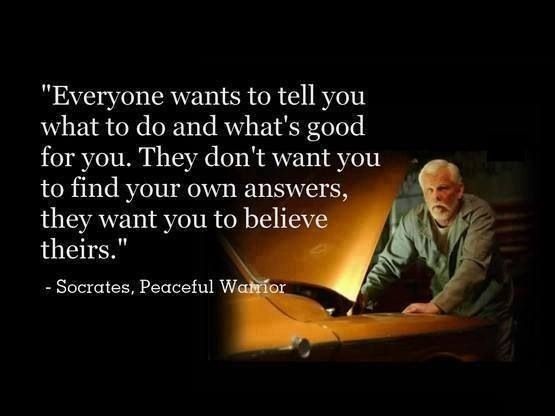A Coaching Power Tool created by Samanta Maranca
(Transformational Coaching and Healing, ARGENTINA)
Always remember that your Censor’s negative opinions are not the truth … Beyond the reach of the Censor’s babble we find our own quiet center, the place where we hear the still, small voice that is at once our creator’s and our own.’ (Julia Cameron)
From a very early age, we have been trained to behave according to what other people (or society) considered to be appropriate, acceptable, or ‘normal’. Most of our behaviours have been judged or labelled as ‘good’ or ‘bad’, worthy of praise or worthy of punishment.
We once expressed our own selves freely and proudly, we made decisions guided by our inner wisdom, and trusted ourselves completely. Later on in life, though, as a result of playing the social game for some time, we probably learnt that certain emotions, thoughts and behaviours were considered more acceptable – and made the people around us feel happier and at ease – whereas others made people uncomfortable, fearful or uncertain and, thus, were to be avoided or concealed. Little by little, our focus shifted and instead of listening to our inner voice we began centring our attention on external preferences, judgments and demands. Those, in fact, started to shape our decisions.
As a result, most of us have lost touch with our inner wisdom, with our true desires, our self-confidence to the point that doubt, insecurity, fear, and indecisiveness have taken over. We have learnt to fit in and comply with others’ requests in order to feel loved, acknowledged and approved of. There are so many external ‘voices’ swaying us in so many directions, that it can become challenging to make sure which one we want our lives to head towards.
Self-Application
Self-doubt – It can be present before we make decisions (which might leave un in a place of procrastination, passivity or inaction), while we are making them (which might make us quit or lose faith in our vision) and even after we’ve taken the first steps towards our goals (which can bring about regrets). When we are in a ‘self-doubt mode’, we are not only undermining our own power and wisdom, but we might be allowing for some other forms of self-sabotage. We might be feeding negative self-talk, entertaining fearful thoughts or emotions, having a sense of discomfort, indecisiveness, and uncertainty.
Also, some of these thoughts may be whispering or roaring in our minds:
These thoughts carry with them a sense of heaviness; even thinking about them or expressing them weigh us down.
Self-confidence – Being in a ‘self-confidence mode’ leaves us in a place of clarity, proactivity and assertiveness. It is action-oriented, it is passionate about achieving goals, it is focused on giving, creating, sharing. Self-esteem is in place. We feel independent and can therefore make decisions that are aligned with our values and higher purposes. Self-confidence brings about a sense of lightness and flow.
The thoughts that are supporting this internal security may be:
When we are self-confident we are most likely to listen to our inner voice, trust that wisdom and respect our intuition. We find the strength to pursue our dreams and live up to our truth instead of giving way to what other people think is most suitable for us. Nobody can know what works best for us since we are the experts in our lives!
Instead, when we don’t trust ourselves we might easily get confused and allow other people to make decisions for us, for fear of making a mistake, losing their approval or being judged. As a result, we may end up feeling resentful since we might feel we have been living someone else’s life (instead of being true to ourselves).
Case study
Anne had lived in a New York flat for three decades. She worked nearby; everything was handy and she had created a structure that was supporting her in achieving her goals. She had recently identified her desire to live in a more natural surrounding, which would mean moving to the outskirts of the city. She felt ready to make that move and stepped into action. A couple of weeks later she was living in a house, far from most of her relatives and closest friends, far from the places she used to frequent, and found out that her old structures were no longer in place. Her enthusiasm slowly began to fade, giving way to feelings of anxiety, impatience and frustration. She went into ‘self-doubt mode’ and wondered whether she had made the right decision, whether she might have stretched out too much and even wished she was still back in the city where things were running so smoothly.
She had forgotten her initial motivation for moving to that new place and couldn’t see the wood for the trees. As she worked with her coach, she uncovered her underlying commitment to perfectionism, which was preventing her from acknowledging and celebrating her achievements (and feeling confident about the direction her life was heading towards). She discovered some of the patterns that could have been supporting that underlying commitment:
As she worked with her coach she reconnected with her inner wisdom and became aware of the (internal and external) resources that would help her move forward in a more confident and lighter way. Once she was able to revisit those thoughts and beliefs, she could embrace a much more empowering perspective – and learn valuable lessons along the way!
When she tuned into the ‘self-confidence mode’, she was able to:
Not only did she not feel overwhelmed but she also learnt that instead of focusing so badly on the outcome she could enjoy the process and how things unfolded (patience / acceptance), she could break goals into smaller steps in order to put things into perspective (objectivity) and acknowledge herself for her small wins (gratitude / self-confidence).
